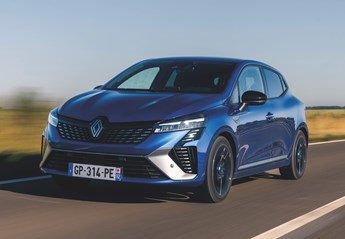We use cookies to ensure that we give you the best experience on our website. If you continue without changing your settings, we will assume that you are happy to receive all cookies on the Business Car website. However, if you would like to, you can change your cookies at any time

The start point for the best source of fleet information |
First drive: Renault Clio
Date: 29 August 2023 | Author: Sean Keywood

|
|
||||||||||||||||||
The fifth-generation Renault Clio was one of our favourite superminis when it made its debut in 2019, and now the time has come for a mid-life facelift. Having introduced an E-Tech hybrid powertrain option to the range in 2020, Renault has very much made this version the focus of the updated model, although having initially announced that the Clio would be going hybrid-only in the UK, Renault has subsequently decided that a pure petrol option will also remain. Still, it's the hybrid, which arrives first, that we're concentrating on here. This has received a slight power increase which actually predated the facelift by a few months, so a total of 145hp is now on offer from the 1.6-litre petrol engine and electric motor.
The instant torque of the electric motor makes the Clio E-Tech nippy in town - Renault says up to 80% of city driving can be done on EV-power alone, which seems reasonable - and the total system output is plenty for moving around generally. However, when maintaining 30mph you do get intermittent droning noises as the engine cuts in and out, and various whirring and whistling sounds from the electric motor the rest of the time, although thankfully none of this is deafeningly loud.
The Clio handles well and is enjoyable to drive, flowing nicely between bends, though with the extra weight of a hybrid system it perhaps isn't the last word in supermini lightness. Ride comfort is pretty good, although the seats fitted with the new sporty (and also range-topping) Esprit Alpine grade tested here are on the firm side.
As facelifts go, the exterior styling updates to the Clio are quite noticeable, and do a good job of moving it closer to the larger, modern Renault models such as the Megane E-Tech and new Austral in appearance - particularly with the DRL light signature lit up on the move.
Interior trim quality is reasonable for a supermini but nothing special, considering our test car's range-topping spec, although we did like its sporty blue seatbelt trim. The 10in driver display fitted with the Esprit Alpine grade works well, and the 9.3in touchscreen also included at this grade is usefully responsive, with physical heating controls retained. We would however like the centre armrest to be mounted further forward.
Rear leg and headroom is good for the segment, and the boot of the hybrid version is a decent size at 301 litres, although some space is lost compared with the pure petrol version's impressive 391 litres, and there is a quite high loading lip.
A glance at the cost sheet shows the Clio stacking up well against the hybrid supermini competition. In comparison with the equivalent Toyota Yaris GR Sport, the Clio Esprit Alpine is cheaper to buy - despite being more powerful - and has stronger expected residual values, while falling into the same company car BIK tax band. Given the high esteem the Yaris is held in, this has to make the Clio an attractive proposition.
Renault Clio E-Tech Hybrid Esprit Alpine
P11D: £23,885
Residual value: 54.3%
Depreciation: £10,906
Fuel: £5,993
Service, maintenance and repair: £1,895
Cost per mile: 31.32p
Fuel consumption: 65.7mpg
CO2 (BIK %): 97g/km (24%)
BIK 20/40% a month: £96/£191
Luggage capacity: 301 litres
Engine size/power: 1,598cc/145hp
Verdict |
8/10 |
|||
 |
|
 |
|
|











